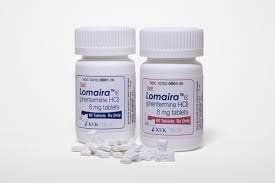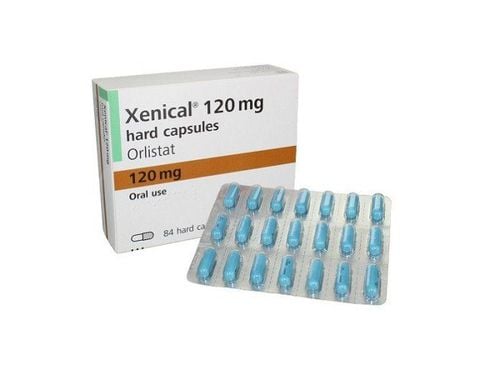This is an automatically translated article.
Currently, Qsymia is commonly used to treat conditions such as being overweight or obese, which can increase the risk of heart disease, diabetes, high blood pressure or shortened life expectancy. In order to get the best results from the drug, you need to strictly follow your doctor's instructions throughout the course of taking this medicine.1. Uses of the drug Qsymia
What does Qsymia do? Currently, Qsymia is commonly prescribed for people who are overweight, obese, or have weight-related problems. This drug is approved for use by people who are implementing a behavior modification lifestyle, physical exercise, and a reduced-calorie diet program to help reduce body weight.Losing weight and keeping it at a healthy level can significantly eliminate the potential health risks that come with obesity, including heart disease, diabetes, high blood pressure and reduced life expectancy.
Qsymia works by reducing your appetite and increasing the energy your body uses or affects certain parts of the brain. This drug is a combination of topiramate and phentermine. Among them, phentermine is an appetite suppressant and belongs to the class of sympathomimetic amine drugs. On the other hand, topiramate is known to be an anticonvulsant or antiepileptic drug.
2. How is Qsymia used?
Because Qsymia may pose some health risk to an unborn baby, it should only be prescribed and dispensed by doctors or pharmacies under certain circumstances.Before you start using Qsymia , you need to closely follow your doctor's instructions and read the prescription leaflet carefully. This medication is taken by mouth, can be taken with food, and is usually taken once daily in the morning. You should not take Qsymia at the end of the day because it can cause trouble falling asleep or staying asleep.
When taking pills, you need to swallow the capsules whole instead of crushing or chewing them. This can help you avoid releasing all of the medication in your body at once and reduce your risk of side effects.
The dose of Qsymia will depend on your medical condition and response to treatment. To help reduce the risk of side effects, doctors often ask patients to start with a low dose of the drug and then increase it gradually. While taking the medicine, follow your doctor's instructions carefully.
Qsymia can cause kidney stones to form, so to prevent this you should drink plenty of water and other fluids while taking it. If you suddenly stop taking Qsymia, you may experience withdrawal symptoms, such as seizures. Therefore, you should reduce your dose slowly according to your doctor's instructions to prevent this condition. In addition, you are also more likely to have withdrawal symptoms if you have used this medicine for a long time or in high doses.
Although Qsymia can provide weight loss benefits for many people, it can also sometimes be addictive. This risk seems to be higher if you have a substance use disorder, such as alcohol/drug abuse or addiction. Ideally, you should not increase your dose on your own, take it more often, or use it for a longer time than prescribed. Not only will this not help you reach your treatment goals faster, but it also increases your risk of serious side effects.
Besides, Qsymia medicine can be absorbed through the skin and lungs, causing adverse effects on the health of the fetus, so women who are pregnant or planning to become pregnant should avoid taking this medicine.

Thuốc Qsymia thường được chỉ định sử dụng cho những người đang trong tình trạng thừa cân, béo phì
3. Qsymia drug side effects
Sometimes, Qsymia can cause unwanted side effects, such as drowsiness, dizziness, dry mouth, fatigue, trouble sleeping, tingling in the hands/feet, constipation, or a bad taste in the mouth. metal. If any of these side effects occur for a long time without improvement, or even get worse, you should immediately notify your doctor for timely support and treatment.Also, contact your doctor right away if you have any of the following serious side effects:
Temporary loss of concentration Difficulty remembering words or things There are signs of kidney stones, such as kidney stones. such as fever, chills, painful urination, pink or bloody urine. Tachypnea Heart rhythm disturbances, such as fast/slow or irregular heartbeat. Bone pain or fractures Loss of consciousness Changes in ability or desire to have sex Bleeding or unusual bruising on the body Some people who are taking anticonvulsants may experience depression , negative thoughts or mental problems while taking Qsymia . You should tell your doctor right away if you notice any unusual or sudden changes in your mood, thoughts or behavior, including signs of depression, suicidal thoughts and thoughts. about self-harm.
In addition, Qsymia can also cause serious eye problems, usually within 1 month of starting treatment, but this side effect is quite rare. If left untreated, this eye problem can lead to permanent blindness. Therefore, when you notice signs such as sudden vision changes, blurred vision, pain or redness while using Qsymia, you need to seek medical help immediately.
If you take Qsymia together with valproic acid, it can cause serious metabolic problems (high levels of ammonia in the blood). Tell your doctor right away if you experience sudden or unexplained fatigue, vomiting, mental changes, and decreased alertness.
In addition, other life-threatening side effects from taking Qsymia are sometimes (rare) and require medical treatment as soon as possible, including difficulty speaking, seizures. , severe headache and weakness on one side of the body.
This medicine rarely causes serious heart or lung problems. However, this risk is increased if you use Qsymia for a long time and take it with other herbal products or appetite suppressants. You need to stop taking this medicine and see your doctor soon if you have any symptoms, including chest pain, shortness of breath with exercise, decreased mobility, fainting, swelling of the legs/ankles or feet .
Occasionally, some people taking Qsymia may also experience a serious allergic reaction, with noticeable symptoms such as rash, itching, swelling in the throat/tongue/face, feeling short of breath, and dizziness. face. When the above symptoms occur, you need to seek timely solutions or seek medical help.

Thuốc Qsymia có thể gây ra các tác dụng phụ không mong muốn
4. Precautions for Qsymia side effects
Before using this medication, you should talk to your doctor if you have a history of allergic reactions to any sympathomimetic amines, including decongestants (pseudoephedrine), stimulants (amphetamine), antidepressants appetite suppressant (diethylpropion), or have any other allergic conditions. Furthermore, Qsymia also contains some inactive ingredients, which may increase the likelihood of allergies and other health conditions.Here are some cases where you need to consult a doctor before using Qsymia to prevent and avoid experiencing side effects of the drug, including:
Patients with glaucoma People with high blood pressure Pressure People with a personal and family history of a substance use disorder, such as drug and alcohol abuse or addiction. Have heart disease, such as a heart attack, chest pain, heart murmur, irregular heartbeat, and heart valve problems. Mental or mood problems, such as severe agitation, anxiety, depression, and suicidal thoughts. High blood pressure in the lungs Stroke Overactive thyroid Seizures Kidney disease, including kidney stones Liver disease Metabolic acidosis Diets high in fat but low in carbohydrates (such as the ketogenic diet). In addition, using Qsymia may make you feel dizzy, drowsy, or have blurred vision. Therefore, to prevent this side effect, you should not use alcohol or marijuana while taking the drug, and should not drive or use machines when you are not alert and your vision is not clear.
This medicine may also make you sweat less and make you more susceptible to heat stroke. Ideally, you should avoid doing things that make your body feel too hot, such as doing heavy lifting, exercising in hot weather, or using a hot tub. When the weather is hot, you should drink plenty of water and wear comfortable clothes. If you feel too hot, you should quickly find a place to cool down and rest. In case of fever that does not go away, mood and mental changes, dizziness or headache, you need to see your doctor as soon as possible.
If you develop diabetes while using Qsymia, check your blood sugar regularly as directed by your doctor. Through your blood sugar test results, your doctor can adjust your diabetes medication during your treatment with this medicine.
Children and the elderly may be sensitive to the side effects of Qsymia , especially adults with high blood pressure and children with delayed growth. These subjects need to talk with their doctor before using the drug to limit and prevent the above risks.
In addition, Qsymia should also not be used during pregnancy because it has a high potential to negatively affect the development of the fetus in the womb. If you are pregnant or suspect that you may be pregnant, you should take a careful pregnancy test monthly before and while taking this medicine. Women who are breastfeeding should also avoid using Qsymia because it can cause unwanted side effects in the infant.

Nếu bạn bị bệnh tiểu đường trong khi sử dụng thuốc Qsymia, hãy kiểm tra lượng đường huyết thường xuyên
5. Qsymia can interact with other drugs?
Using an MAO inhibitor along with Qsymia can cause serious drug interactions, even death. Ideally, you should avoid taking MAO inhibitors (including linezolid, isocarboxazid, methylene blue, phenelzine, moclobemide, rasagiline, procarbazine, safinamide, tranylcypromine, and selegiline) during treatment with Qsymia. Most MAO inhibitors should not be used within 2 weeks before you take Qsymia.In addition, if you have been taking other appetite suppressing medications in the past year, such as ephedra or diethylpropion, you should also consult your doctor before taking Qsymia with these medications to Avoid drug interactions.
Several other products may also interact with Qsymia, including orlistat or stimulants such as cocaine, ecstasy, methylphenidate, and amphetamines.
In case you are using hormonal birth control along with Qsymia, such as the pill or patch, you need to tell your doctor if you have any new or sudden bleeding. any other.
Caffeine can also increase the side effects of Qsymia, so you should avoid consuming large amounts of caffeinated beverages (such as coffee, coke or tea), chocolate, or taking over-the-counter products that contain caffeine. contain caffeine.
On the other hand, the use of Qsymia may also affect your test results, including brain scans that detect Parkinson's disease. Therefore, before having the test, you should tell your doctor if you are taking this medicine.
Please dial HOTLINE for more information or register for an appointment HERE. Download MyVinmec app to make appointments faster and to manage your bookings easily.
Reference source: Webmd












